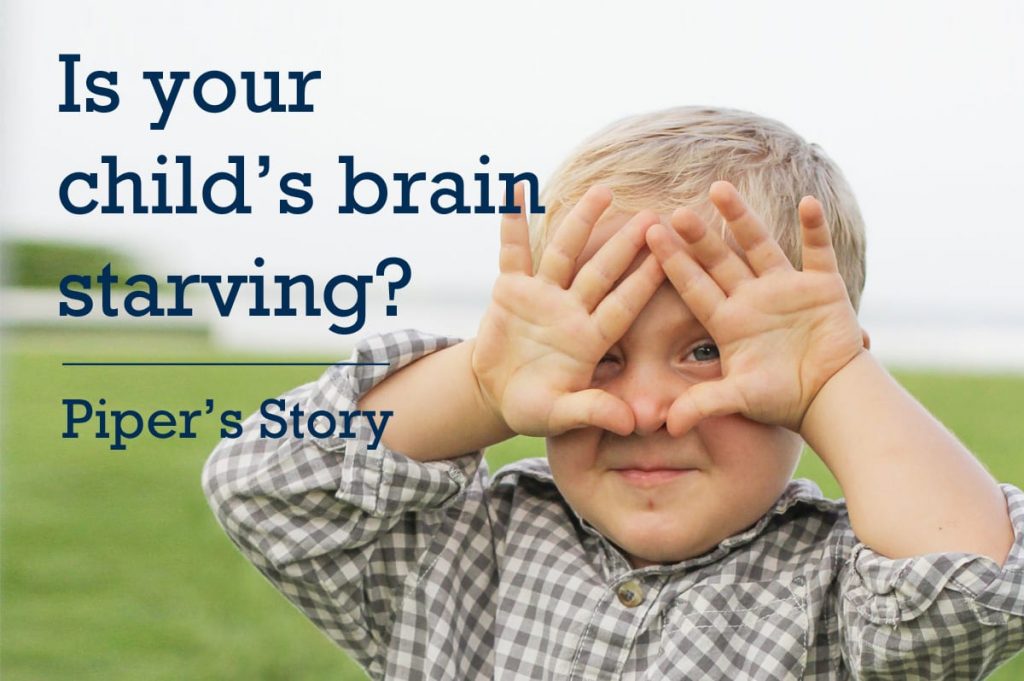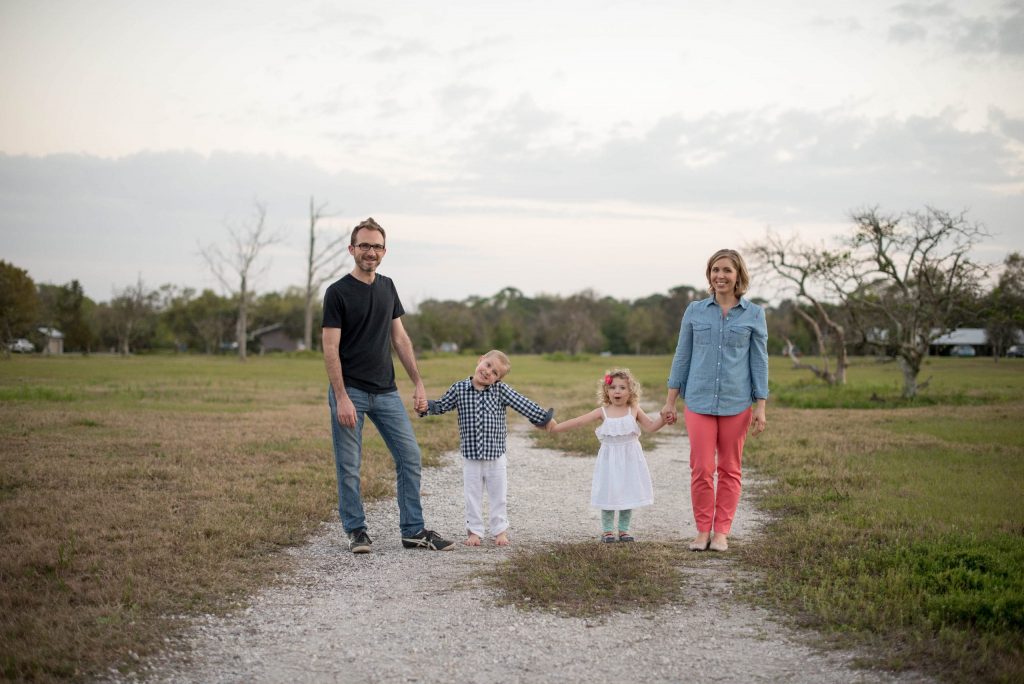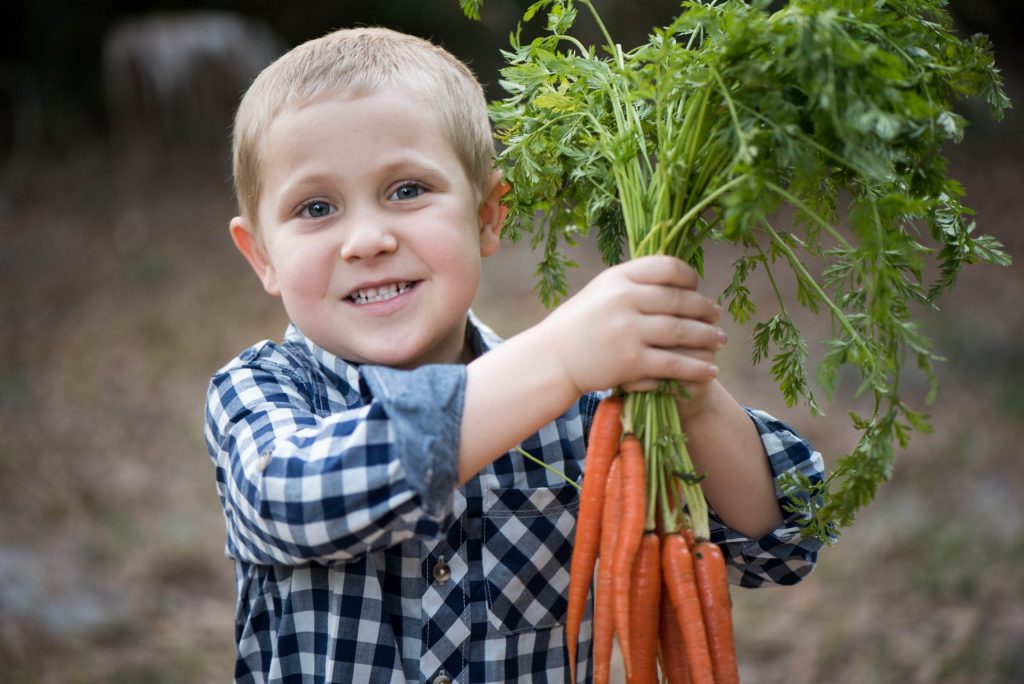This post is long overdue.
A story I’ve been wanting to share, but just haven’t had the courage to sit down and write.
A story about my son, Piper, a speech disorder, a starving brain, and how real food and a key nutrient played a key role in his rehabilitation.
This is Piper’s story…
In 2009 I found out I was pregnant. The thought of carrying life inside my belly for nine months seemed to be a daunting task. I, like most mothers, wanted to provide my child with the very best start in life. One area of life that wasn’t ideal was food. I ate a Standard American Diet (SAD) of heavily processed foods, low-fat everything and lots of take-out. After spending many nights watching documentaries (like Food Inc.) and reading countless Micheal Pollan books, I was convinced a dietary change had to be made. I cut all the processed food from our life. I also went a step further, a huge step, I eliminated all animal products from my diet. The only animal product I consumed was honey.
I’m talking strict!
My pregnant body, now very close to delivering a new baby, was being nourished solely off plant-based foods and juicing.
March 5, 2010 was the big day. A day I remember very well. Thirty-six hours of natural labor and one eight and half pound baby later, I was a mom!
That first year was a blur. Sleepless nights, new learning curves, hours of baby snuggles, lots of nursing, lots of ear infections, and the sweet scent of a baby.
I had continued with my vegan lifestyle during Piper’s first year. I was proud to have a child who would never be tainted by animal products. A child that would only live off fruits, vegetables, and grains.
Shortly after Piper turned one, I started to observe that his little friends were flourishing verbally. Slowly his friends switched over from baby-talk to understandable words. Piper continued to say that same /mmmm/ and /bbbbb/ sounds. No words, just sounds. Not wanting to compare, I assured myself he was a late bloomer. Words would come soon enough.
When Piper turned two I weaned him from nursing. He seemed to be the ideal eater, a plant-based child. Despite his healthy and growing body, I became concerned about his speech. He continued to only use two sounds to communicate. His vocabulary consisted of around three real words, but even those were hard to decipher. “He’s a late bloomer!” I listened to the other moms share all the cute new phrases and words their children were developing daily.
My heart sank.
He’s gotta be a late bloomer.
I waited.
I finally voiced my concern to Piper’s pediatrician. A very gentle doctor open to alternative people like our family. I expressed my concerns over his limited vocabulary of now five words. I was desperate and discouraged. I wanted so badly to communicate with my son. I wanted to hear him say his name and “I love you.” Anything! Just words. It seemed as though he was trapped. Longing to communicate, but unable to do so. The doctor checked his records and noticed a trend: ear infections.
Several months later, we sat in the waiting room of an ENT who advised ear tubes. We were told Piper’s ears were blocked with fluid and the tubes were our answer to communicating with our son. Within weeks we were to expect talking.
Hope.
That’s what I experienced at that moment!
Lots of Hope.
We went through the surgery a week later. I couldn’t wait to hear my son talk! I waited a couple of weeks. Nothing. Another week. Still nothing.
It was at this time that Piper was evaluated by a speech pathologist. The speech pathologist said she believed Piper had something called Apraxia.
Apraxia of speech, also known as verbal apraxia or dyspraxia, is a speech disorder in which a person has trouble saying what he or she wants to say correctly and consistently. The disorder may result from a stroke, head injury, tumor, or other illness affecting the brain. Source
I left with a heavy heart. The prognosis wasn’t good. The speech pathologist recommended speech therapy with as many sessions in a week as possible. We were told the journey of apraxia was long and one that would take many years of therapy to see positive results.
A month after the diagnosis, we found a fantastic speech teacher who was willing to work with Piper in her home a few times a week. A friend also recommended seeking a nutritional counselor as an alternative treatment.
After intense meat cravings during my second pregnancy, I had recently started incorporating pastured meat into our family’s diet; however, we still followed for the most part a plant-based diet. I personally laughed at the idea of my child needing a nutritional counselor. The idea that my child needed counseling on how to eat seemed absurd. I didn’t want to appear proud, so I agreed to get the opinions of the counselor.
During the first meeting, the counselor immediately questioned the fat intake in Piper’s diet. Piper being raised a vegan for the first two years of his life, didn’t care for any animal products and lived off bread and produce. The counselor wasn’t very pleased with that diet.
What?
What could be missing?
We were told to put Piper on fish oil (omega 3’s), doses of vitamin D, and increase his fat content. Apraxia is believed to stem from a neurological disconnect between the brain and the mouth, and the counselor seemed convinced that the omega 3’s and fat were critical links.
I was intrigued.
Over the next few weeks, I bought every book I could find on children and food. Was I depriving my son of critical nourishment which he needed? A missing link?
After scouring the pages of books, particularly Nourishing Traditions, I was convinced Piper needed a diet that nourished his brain.
His brain was starving.
Starving for fat!
In an effort to eat healthier, I had removed nearly all sources of fat, particularly animal fat, from our diets. During the most critical time of brain development I had starved Piper’s brain of a critical nutrient.
Recently it has been discovered that the Omega-3 fats are necessary for the complete development of the human brain during pregnancy and the first two years of life. The Omega-3 fat and its derivative, DHA (docosahexaenoic acid), is so essential to a child’s development that if a mother and infant are deficient in it, the child’s nervous system and immune system may never fully develop, and it can cause a lifetime of unexplained emotional, learning, and immune system disorders. Source
The human brain is considered to be the most sensitive organ in the body to food, and is made up of near sixty percent fat. During the first two years of a child’s life the brain triples in volume requiring nourishing foods with lots of good fat. Nearly fifty percent of the food children consume is used for brain growth and fat is critical in this development. Without good fat, the neurotransmitters in the brain can’t properly transmit and a disconnect can easily occur affecting the entire body (emotional, behavioral, learning and language). Good fat is critical in pregnancy and for growing children.
I believe this was a critical piece to Piper’s speech delay. Piper simply needed a diet of real food and essential fat which would nourish his brain.
After nine months of a diet rich in good, traditional fats and real food, Piper today talks and communicates like a mature three-and-a- half year-old. Sure, he says words here and there that are difficult to understand because he leaves off the end sound or has difficulty with the beginning, but he talks (all the time)! He communicates with words people understand. His vocabulary has blossomed from a mere three words and two basic sounds to hundreds upon hundreds of words!
The biggest change that I believe helped Piper was… fat! A diet rich in good fat for a growing brain. We began to see remarkable changes in Piper within just a couple of months of consuming good fat and real food.
Here are the foods that I believe played a critical role in nourishing Piper’s brain:
- Raw, Pastured Whole Milk, Butter, Cream, and Cheese: Rich in fat-soluble vitamins A and D and other crucial nutrients. You can read more about why we consume raw milk, here.
- Fermented Cod Liver Oil: Rich in Eicosapentaenoic Acid (EPA) and Docasahexaenoic Acid (DHA). FCLO supplies essential fatty-acids for the brain. I use Carlson brand.
- Soaking and Sprouting Grains: This traditional practice breaks down the phytic acid and anti-nutrients allowing the body to more easily digest protein, fats, and essential amino acids from grains.
- Fermented Foods: Yogurt (homemade recipe; Good Store-Bought Brands: StonyField Grass-Fed, Maple Hill Creamery, Organic Valley Grass Milk Yogurt, and Seven Stars), milk kefir (homemade recipe; Good Store-Bought Brand: Maple Hill Creamery) , water kefir, and kombucha, provide the body with good bacteria. This good bacteria produces essential vitamins the body needs, such as: Vitamin A, B vitamins, and essential fatty-acids.
- Homemade Bone Broth: Provide essential vitamins, minerals, and essential amino-acids. Bone broths are rich in protein and healing properties. I make this broth and use it to cook Piper’s favorite rice and any sauces.
- Pastured Meats: Rich in iron, zinc, calcium, and vitamins A, E, and B12. Pastured meat is a healthy source of good fats.
- Egg Yolks from Pastured Eggs: Rich in omega-3 and protein. Most digestible amino-acids available to the body.
I truly believe with these small changes we have been blessed to witness the power of a healthy diet in a child’s life. I believe Hippocrates said it best, “Let food be thy medicine and medicine be thy food”.
2015 Update:
I’m overwhelmed by the amazing response to Piper’s story. Thank you for commenting and sharing your stories with me over the past eighteen months. It’s truly been a blessing to read emails and comments about the difference real food is making in so many children.
Today, Piper is an energetic five year-old boy who loves to talk and share stories!! He loves playing soccer and Legos. He still consumes a nutrient-rich diet. Piper’s favorite foods are: steak, hard-boiled eggs, lentils, chicken, broccoli, and the Hulkbuster Smoothie.







Hello,
I wanted to thank you for sharing this. I am a mom and I work with children that have psychiatric issues. Since my daughter we have been strictly a whole food family which does include meat at least 2 times a week, dairy and eggs every day. I get almost all my food from the farmers market except some of the grains. I also work with environmentalist and many of them are vegan. I tell them yes we need to change the way the US eats meat and how much of it they do, but the human body is not meant to have only produce. I know from my medical training how important vitamin B12 which you can only get from an animal byproduct no matter what other vegans say. You can take a supplement but this is from oil and probably worse for the body and world. I will be sharing your story with them to prove while being vegan may seem healthy it is missing some of the important things especially needed for our brains which we need if we are going to learn how to get this planet out of the mess we have gotten it into. So thank you.
Thank you so much for this post! It was an answer to a prayer. I have so many questions and would love to chat but I don’t know where to even start so I’ll just leave it at “thank you”!
Hey Stacy, I’m so thrilled to hear that Piper’s story was an answer to prayer. If you ever want to reach out, please feel free to email me: [email protected]. Best, Kristin
Hello! I am a speech therapist and really enjoyed reading about your story. I’m so glad you were able to get the help you needed for your son and that your son is speaking more now.
I just wanted to add for your readers who might be searching for reasons their child has apraxia that sometimes it can be due to enlarged tonsils or adenoids causing sleep apnea. If the brain is starved of oxygen during sleep, this can also lead to apraxia. So if anyone reading this comment is thinking about nutritional therapy for their child with apraxia of speech, please also check that your child is not suffering from sleep apnea!
Thank you so much for sharing, Heather!
This is wonderful. Can you please post this to Facebook. So many mothers who are thin themselves are forcing their own issues on their babie. Feeding them low fat, or starting them out as vegan. I am afraid this is happening to my granddaughter.
Thank you for sharing your story! It’s very similar to my son’s story also. Love that the message of health is spreading.
Dear Kristin,
Two things stand out to me in this article. 1. your obvious love of and trust in the Lord. 2. your obvious love and devotion to your family. You are an inspiration to many. Keep up the good work. Please continue putting Jesus in your blogs. God bless you and yours.
Thank you so much for the encouraging words, Rev. Suzanne.
Kristin – thank you so much for writing this! Through all the early intervention, doctor’s and specialists we have seen over the years – no one has ever mentioned diet to me. I feel so thankful right now that I read your article. I am encouraged by the success that Piper experienced. You are an incredible mom!
I am living with a grown man who is horrified by switching up his incredibly processed diet. I have 4 children and one with special needs. I feel overwhelmed, but want to make this switch. How can I do that on a budget? I am a full-time teacher and time is an issue. I looked for coops, put out adds on Craigslist looking for local people to purchase from (only 1 person has responded with free range and organic eggs). Can anyone offer guidance?
Hey Carri,
Congrats on making the switch to real food! At first the switch can be really overwhelming (particularly when family members aren’t 100% there yet–my husband was like that!), but I think it’s important to remember that this switch is about small changes over a long period of time (a lifetime).
First, I recommend sitting down with your husband and letting him know you aren’t switching to just green juices and salads :), just better versions of his favorite foods. Then, ask for him to share his favorite foods. Does he love hamburgers? Make it a priority to find grass-fed ground beef, or as close to grass-fed as possible, and make delicious homemade burgers! Even top them with real cheese. Slowly, while you offer real versions of his favorites, add new foods. I think husbands are often fearful that real food will be bland and just a bowl of lettuce. It’s time to prove him wrong, in the sweetest, nicest way, and win over his taste-buds!
Second, I highly recommend switching over to real food slowly to help with the budget. Each month choose a few foods you’d like to switch from processed to real. For example: If you want to try switching from freezer biscuits to homemade biscuits, instead of purchasing the freezer kind, purchase the ingredients for homemade biscuits. In the end, while the fresh produce (particularly organic) can be more expensive, I’ve found the dry goods actually become cheaper than buying the boxed processed food. That same bag of flour can make multiple different meals versus that bag of frozen biscuits, a one-time use product.
Third, I love purchasing organic, but I don’t think it’s 100% necessary. I’d much rather my family eat conventional blueberries than no fruit at all just because organic food may not fit the budget this month. Meats and dairy are always my first priority before organic produce.
If you have any local health food stores in your area they may be able to help direct you to local farms. Many times health food stores have great local connections. Another option is to search “Weston A. Price Foundation” and get in touch with a local chapter. The chapter leaders usually have lots of information on local farms.
Here are a few posts that may help:
https://livesimply.me/2015/01/04/four-weekly-habits-to-make-real-food-affordable/
https://livesimply.me/2015/03/24/how-to-stock-a-real-food-freezer/
https://livesimply.me/2015/03/05/stock-real-food-pantry/
https://livesimply.me/2015/03/20/homemade-vs-store-bought-5-important-questions-you-must-ask/
https://livesimply.me/2014/08/01/ultimate-guide-finding-grass-fed-meat/
Kristin, Kristin, Kristin,
I loved reading your story…..even though it brought up so many emotions in me. 🙂 So much of your story is almost identical to ours. We also thought Thatcher’s issues were due to multiple ear infections during his first 14 months, and kept holding on to hope that he would begin speaking after getting the tubes.
I too feel like the most helpful information and advice we got during the critical years was from a nutritionist. I’m so grateful we found her. I know that the supplements/fats we gave Thatcher made all the difference.
You are an amazing Mother and Piper is so lucky to have you!
I hope you are all doing well.
Maria
Thank you so much, Maria! It was such a blessing to meet you and learn that we share such a similar story with apraxia. That moment was definitely one the major highlights of the conference for me. I truly hope our stories can help so many moms during the critical years of speech and brain development.
I know this blog post is a bit old. I came to it by googling. Read it over. I have been dealing with the same issues and after a LOT of reading I am finally beginning to understand why my daughter has (or had) speech issues so severe that she was diagnosed with apraxia. I believe she did not have enough b12. I do see that you briefly cited b12 as something that needs to be included in the diet. Just wanted to post this to emphasize that if you give a b12 deficient child fats, whether from breastmilk or from fish or fish oil or vitamin E, his body will not metabolize them well. You need both b12 and the fats. Mom needs both during pregnancy, and while breastfeeding, and baby, toddler, and child need them. Lots of Moms are worried if their children are getting enough iron and fats but completely missing out on the b12 factor.
It’s great to hear that you found some important keys to Piper’s growth! I’m thrilled to read about the cod liver oil that you use and I think that I’m going to try it with my nine month old, Pierce. At three months, Pierce was diagnosed with severe egg, peanut, and dairy allergies. I generally worry about protein intake for him and I, but the fat issue never crossed my mind. I’ve always taken a DHA supplement, so I might try the cod liver oil for my little man.
Thank you for being so open about this subject!
Hey Kait, Thank you. We are blessed to live in a day and age with so much info available. I think you may really enjoy the blog Raising Generation Nourished: http://www.raisinggenerationnourished.com/. Renee blogs about kid nutrient-dense recipes and many are egg, peanut, and dairy-free.
How do you give your son the cod liver oil? Do you give him any other supplements ? Krisitn your generation is so blessed to have so much information available to you. What a blessing to be able to change your child’s life by what you feed them! God bless you and thank you for sharing your story so others will be helped.
Thank you, Teresa. I’m blessed by the research that’s available for parents today and that I’m able to share Piper’s story.
I give Piper a tsp of cod liver oil in his orange juice every morning. Carlsons brand makes a great cod liver oil that’s very mild vs. the Green Pasture brand.
Kristin, thanks for a great article! I am so glad you figured it out before it was too late to help your son.
I have just shared this article on a natural mother’s site, especially because there are quite a few who are vegans and vegetarians, and are telling people to stop eating meat when they have any health concerns. Of course, I got attacked by several of them for posting the article, but one mother said that reading it made her realize that she hasn’t been eating the right foods for her unborn baby, and she is going to start eating red meat again.
So, I don’t mind the attacks, if one person has been helped!
Urusla, Thank you so much for sharing. There is so much “nutrition” advice being taught and followed these days just because it’s popular. It’s sad for our kids. Thank you for sharing Piper’s story. I’m so encouraged by the mom’s hearing it and some changing their diets too.
thank you for being vulnerable by sharing your story. it is so difficult to see your little one struggling and not knowing why. thankfully your family discovered the ‘missing link’ in this case.
i believe our western society has forgotten what eating is really about. the ONLY reason to eat is to provide nutrients to your body…to grow, function and heal. we require many different vitamins, minerals, amino acids proteins, carbs and fats for our bodies to function normally and these things come from a wide variety of sources. some very essential nutrients only come from certain sources.
any way of eating that excludes entire groups of foods (or types of nutrients) is going to be detrimental. fats are essential (as is cholesterol :O shocking!!) for healthy brain function…yet as a society we are obsessed with ‘low fat’ and ‘no fat’ options. not to mention that when you take the fat out of something…it needs to be replaced with chemicals to make it taste good.
since getting pregnant (and now having a very active 16 month old) i have become very pro active about feeding my family a variety of REAL foods. i feel my own health has improved dramatically and truly hope to pass on the food knowledge i have acquired to my daughter so she can make better choices than i did through my young adult years.
i am happy to have found your blog and am now a follower 🙂 thank you for inspiring others towards a REAL FOOD REVOLUTION. our health depends on it!
Thank you so much for sharing, Kim. It’s so true our food choices make such a huge difference in the well-being of our family, especially our growing children. Your daughter is so blessed to have a mom who is committed to nourishing her body with real food vs. buying into the fads of today. Great job, mom! Keep up the awesome work 🙂
Thanks for sharing this Kristin! I was vegan when I unexpectedly became pregnant at 41. By the time my daughter was three months old, she was fine but I had hundreds of bruises, energy lower than I’ve ever experienced and both B12 and iron deficiency anemia. I’ve felt bad at times at adding meat back to our diets, but this story makes me realize that there could have been consequences that I never even imagined had I not. The funny thing is that she is 7 1/2 months old now and her favorite food BY FAR is egg yolk. It’s like her little body is craving what it missed. 🙂
Kristin, this is such a touching story and one that so many people need to hear as the nutrition found in traditional foods is fundamental to our well-being. I believe that so many children, including my son, who is now 20 would have benefited from the knowledge that you found when Piper was still small. I know that diet improved my son’s ADD in his teen years and even he says it has. Thank you so much for sharing it. I will be sharing this article over on my site! Take care and enjoy your lovely children. They grow up so fast!
Thank you so much for sharing your story. My son Ethan is 4 1/2 and might be autistic. We haven’t gotten a final diagnosis. He is currently diagnosed as developmentally delayed.
A year ago after lots and lots of reading about autism and diet we started giving my son cod liver oil– high quality, just not FCLO. (As a family of 8 who all take it, I haven’t made the financial jump yet to FCLO.) Within a month of starting that and melatonin for his sleep issues he started making eye contact and started making more sounds and words. We didn’t tell his ST or ET at first. They started commenting about how hard he worked and the results they were seeing.
We tried gluten free and saw HUGE changes. We went back on gluten so we can get some allergy testing done. I’d love to wake up and find out all of his issues were diet related. We are slowly moving towards more traditional diet and have seen major changes.
Wow! Thank you for sharing! That’s amazing. I’ve heard so many stories where fat, like CLO, has made such a huge difference. Diet isn’t always the answer to everything, but it sure can make a huge difference as we both have seen. Keep me updated. Blessings- Kristin
I completely agree that diet is a huge part of a child’s development, and people are thankfully starting to realize how much diet can affect a child’s development. I have a four and a half year old son. He started showing signs of autism around 14 months of age. After two and a half years of the GAPS and SCD diet, therapy, and homeopathy, he is now in a mainstream preschool doing wonderfully. He has an aide that we think will get phased out in the next year or so. His therapists cannot believe the progress he has made, and we are so happy to have our son back! He is completely verbal with a slight delay, completely social, and a just so happy now. I write over at peaceloveandwellness.com about our family’s journey: http://peaceloveandwellness.com/sons-current-progress/. Thanks so much for this post!
Thank you for sharing, Andrea. I’m so glad your son is doing so well!
Wow. What a story. Thank you for sharing. Interestingly, my son was underweight and had a hard time gaining from about the time he was 10 months old, and we were told by doctors to put fat in everything he ate. More butter, more cream. (This was long before I read anything about traditional foods or nutrition). They thought that more calories in meant he would gain weight. Instead, he kind of maintained without gaining weight, and funny enough didn’t have much of an appetite after chugging a bunch of cream. He did however, flourish with his words and in hindsight, I do think it was all that fat he was eating.
That’s very interesting. Thank you so much for sharing. I’m really fascinated about the crucial role fat and brain and speech development have with each other. I think our ancestors might have been on to something ;). Blessings, Kristin
what a beautiful story of humility and healing!
Really moving story, thanks for sharing.